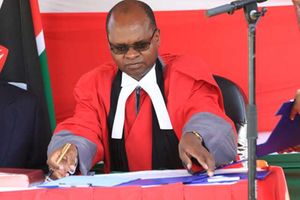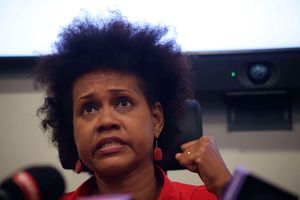
Former Independent Policing Oversight Authority chairperson Macharia Njeru.
Former Independent Policing Oversight Authority (IPOA) chairperson Macharia Njeru has asked his former employer to prosecute rogue security agents he believes are behind abductions, arrests and unlawful use of force against unarmed citizens.
Mr Njeru has written to the current IPOA chairperson, Isaack Hassan, seeking to have the agency hold police officers and their commanders responsible for rights violations done under the guise of enforcing security protocols.
He holds that the law gives Ipoa teeth, and that the agency should use them to bite in a bid to end police excesses.
Mr Njeru has suggested that Ipoa use geolocation – the use of global positioning system (GPS) and internet protocol (IP) addresses to track the exact location of electronic devices – to trace police officers that may have taken part in numerous law violations since June, 2024.
The Kenya National Commission on Human Rights (KNCHR) on Tuesday said it has recorded 85 abductions since July, 2024.
Recorded 61 deaths
KNCHR Deputy Director Kamanda Mucheke said that 25 abductees were yet to be released, and that the State agency has recorded 61 deaths related to anti-government protests that started in June, 2024.
Separately, at least 45 foreign nationals critical of their governments have been abducted or irregularly arrested, with majority being repatriated to their home where they face political persecution.
Uganda (37 nationals), Turkiye (four nationals), Rwanda (one) and Tanzania (one) have all had their citizens abducted in Kenya.
Tanzanian freelance journalist Maria Sarungi on Sunday became the latest victim after being picked up by four armed men.
She was released hours later, and has since claimed that the incident was instigated by her government as retaliation to her criticism of Tanzania’s state of affairs.
In his letter to Ipoa, Mr Njeru said the authority had failed to enforce requirements that police officers wear uniforms with identifiable name tags and service numbers when carrying out operations.
“Sadly Ipoa has failed to enforce these express provisions of the law. The country has seen police officers covered in balaclavas and with no form of identification roaming in our streets, carrying out arrests, arresting and shooting members of the public and brazenly abducting others. This level of impunity was never imagined in our post-2010 Constitutional dispensation,” Mr Njeru’s letter reads in part.
“I recall a decade ago, our investigators applying geolocation mechanism in identifying rogue police [officers] in a number of cases. Further, Ipoa has vast powers that allow it to summon and compel the attendance of anyone from whom it requires evidence, including officers of telecommunication companies,” he further says in the letter.
Rogue police officers
Mr Njeru, an experienced lawyer, was the first Ipoa chairperson, serving between 2012 and 2016.
He also served as the Law Society of Kenya’s representative to the Judicial Service Commission between 2019 and 2024. At the JSC, he served as vice-chairperson between 2022 and 2024.
He was previously a member of the 2009 Police Reform Taskforce headed by retired judge Philip Ransley.
The taskforce’s report was considered in drafting the 2010 Constitution and led to the birth of Ipoa alongside a code of conduct for the police service.
Mr Njeru holds that Ipoa has the power to post its investigators in police teams conducting security operations, and take action against officers who overstep their mandate.
He adds that Ipoa can ensure that rogue police officers are charged, whether through the Office of the Director of Public Prosecutions (ODPP) or private prosecution.
“Where you are convinced that there is evidence against any police officer, including that of inaction or non-cooperation and the ODPP refuses to act on your recommendations, you have powers to initiate action of enforcement of your said recommendations by making appropriate applications in court including pursuing private prosecutions with leave of the court,” Mr Njeru says in the letter.











